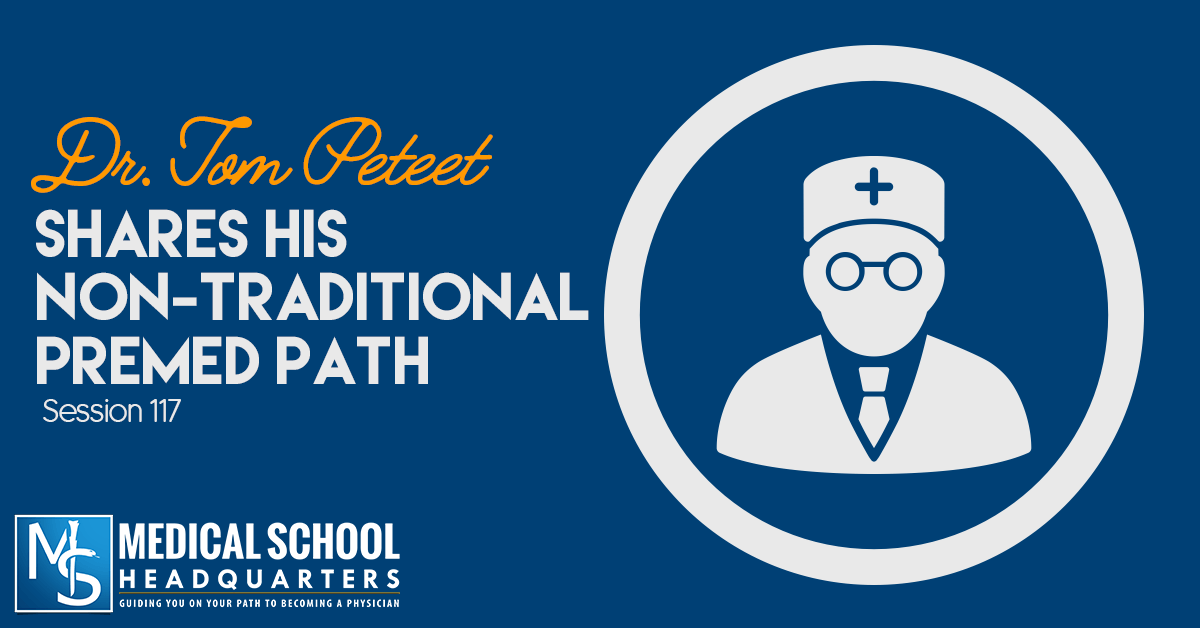Apple Podcasts | Google Podcasts

Session 117
In this episode, I speak with medical resident Dr. Tom Peteet, as he shares with us his nontraditional premed path to medical school.
From majoring in the liberal arts as a premed and pursuing a teaching career to transitioning to medical school, we’ll learn about Tom’s experiences and frustrations along the journey. We’ll also hear some great pieces of advice he has for students, especially for other nontraditional premed students.
Listen to this podcast episode with the player above, or keep reading for the highlights and takeaway points.
When Tom Peteet knew he wanted to be a physician:
- Learning the word “metastatic” as a young kid
- Doing hospice volunteering in college
Going to a liberal arts school as a premed:
- Getting involved in the Teach for America program, a placement organization to place college grads in intercity schools across the U.S.
- He was placed in St.Louis and did teaching for 3 years
- 35 sites that people go to for this program
[Related episode: Pros and Cons of the Liberal Arts for Premeds.]
His path as a nontraditional premed student:
- Took premed classes in physiology and anatomy
- His application taking a long time due to his teaching job
- Getting letters of recommendation from everybody taking a while too
[Related episode: Interview with Nontraditional Premed Expert Richard Levy.]
His experience in medical school:
- Going to UMass Medical School
- Getting frustrated with the transition
- The lack of interaction with other people
- Seeing the lectures were not as advanced as he thought they would be
- Getting support as a nontraditional student
- Getting involved with community engagement projects at UMass (juvenile detention center)
[Related episode: What Do the First Two Years of Medical School Look Like?]
UMass medical school requirements:
- Graduated from high school in Massachusetts; or
- Have been a full-time resident for 5 years
Narrowing down his medical specialty choices:
- A toss up between psychiatry, family medicine, and internal medicine
- Ended up applying in family medicine and internal medicine
- Preferred an urban setting, small programs
- Matching into internal medicine
Tips to those who are in their transition to residency:
- After your 1st year of residency, you have a lot more freedom to explore the aspects of medicine you’re interested in.
- Maintain connections during your first year with faculty and other residents doing interesting projects. They will help you immensely!
Tom’s creative outlet of writing articles for KevinMD:
- How he gets his creative juices flowing
- Been writing since he was a teacher
- Getting a lot of ideas from Twitter
- Reading other posts on KevinMD
- Inspired when learning about medical topics (medical records)
[Read Tom Peteet’s articles on KevinMD.com.]
Tom’s plans for life after residency:
- Sleep!
- International rotations
- Spending a couple of years abroad working within a medical school and teaching
- Collaborating with U.S.-based institutions
Programs for physicians going abroad:
- Harvard Botswana Program
- Global Health Fellowships
[Related episode: Shadowing Abroad as a Premed with Gap Medics.]
Some pieces of advice for nontraditional premed students:
- See as much health care as you can. Spend a lot of time in a hospital and around the culture of medicine.
- For nontraditional premed and medical students: Seek out other nontraditional premed students, as well as anyone in medicine with similar interests and experiences as you.
- Talk to them about they’ve integrated those experiences into their work in medicine.
Links and Other Resources
- Check out my Premed Playbook series of books (available on Amazon), with installments on the personal statement, the medical school interview, and the MCAT.
- Related episode: First Year of Med School for a Nontraditional Premed.
- Related episode: How Do I Choose a Major as a Nontraditional Premed?
- Need MCAT Prep? Save on tutoring, classes, and full-length practice tests by using promo code “MSHQ” at Blueprint MCAT (formerly Next Step Test Prep)!











